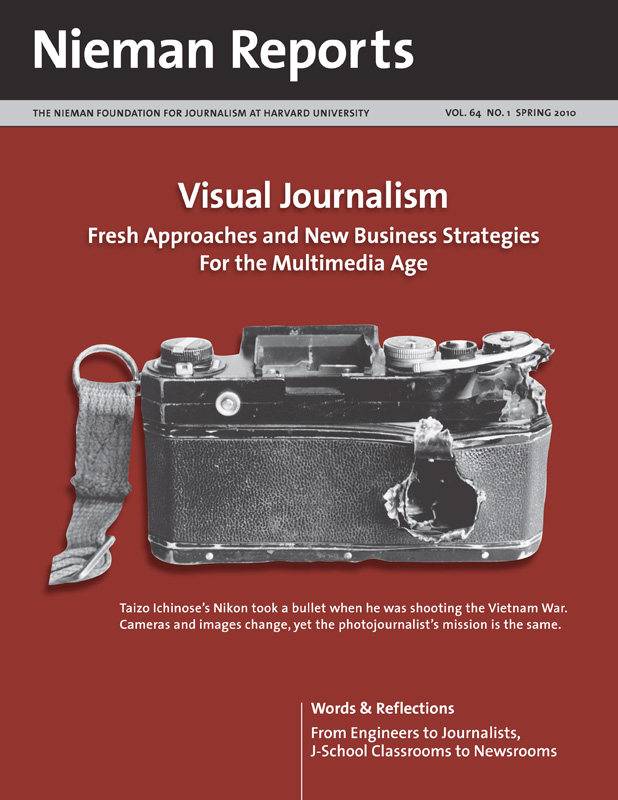Do any of the following questions strike a chord? When I am stretched so thin that I’m no longer producing quality journalism, do I quit? What are the alternatives? What medium should I use to ask challenging questions vital to our society? How do I respond when bullies and blowhards publicly berate me or go after my news organization for being too political or even subversive? If I see clear examples of entire news organizations that bend or ignore facts to fit a preconceived political agenda, do I speak up and call public attention to this bias? Or do I simply admit that I find the state of journalism quite depressing as I wonder whether continuing to practice it poses a threat to my health?
The life and tragic death of television journalist Don Hollenbeck, a CBS News commentator, reporter and press critic, might not provide us with answers to these core questions. But it opens a window for us to look at a valuable experience from journalism’s history, one that holds as much relevance today as it did when Hollenbeck committed suicide more than half a century ago.
Those who have seen “Good Night, and Good Luck” know that Hollenbeck appears in that film as a desperate character, besieged by redbaiters and pleading for Edward R. Murrow to help him. But Murrow cannot or at least does not. Then Hollenbeck turns on the gas jets in his Manhattan apartment and kills himself.
In his superbly detailed biography of Hollenbeck, Loren Ghiglione, the Richard A. Schwarzlose Professor of Media Ethics at Northwestern University’s Medill School of Journalism, rescues Hollenbeck from a somewhat obscure role in the dark days of blacklisting, and offers clear messages for reporters today who are struggling to maintain solid values of journalism in a shifting world.
It’s always tempting to look for the “sermon in the suicide,” which is Joan Didion’s phrase and the title of Ghiglione’s last chapter. Plenty of Hollenbeck’s friends and colleagues were quick to blame his death on New York Journal-American columnist Jack O’Brian, a McCarthyite and redbaiter who relentlessly bullied and badgered Hollenbeck. Ghiglione crafts a more accurate, less simplistic, and more nuanced picture, including the fact that Hollenbeck’s mother slit her own throat and that Hollenbeck abused alcohol and appeared to be severely depressed. CBS did not fire Hollenbeck and others endured worse persecution. It appears that Hollenbeck’s personal and family history played a bigger role in his death. Yet to say this does not dismiss the role that the vicious climate perpetuated by McCarthyism may have played in Hollenbeck’s demise.
To focus on Don Hollenbeck’s death is to miss the lessons of his life. He was the original multimedia journalist. He began as a newspaperman in Lincoln, Nebraska. He transitioned to NBC and ABC radio and CBS radio and television as a correspondent who covered the landing of the Allies at Salerno, Italy. He was quick, even impetuous, in quitting job after job at The AP in San Francisco and for NBC in Europe at the end of World War II. His attitude was that he was good enough that he could always find work. And sure enough he did, moving from the newspapers to NBC and CBS. It’s ironic that this fine biography begins with the possessive—CBS’s Don Hollenbeck—since he was a journalist who worked for a wide variety of news organizations and was fiercely independent.
Hollenbeck pioneered press criticism on radio with the program “CBS Views the Press.” There he regularly picked apart the pages of the most influential newspapers and chains by offering real criticism—not name-calling. Despite the explosion of broadcast and cable TV stations, no one does what Hollenbeck did on radio. He responded to a relentless barrage of criticism with measured, fair, principled analysis. He called balls and strikes and tried, in at least one case, to sidestep a fistfight. It was an ugly time, but perhaps no uglier than ours. Commentator Ann Coulter picked a fight with 9/11 widows; Hollenbeck’s critics jeered at his suicide, which as Ghiglione points out, was by no means the only one.
Hollenbeck cheered Murrow in his finest hour. He was the first voice heard after the well-known showdown between Murrow and Senator Joseph McCarthy, blurting his pride at the CBS network’s finest hour. But less well-known is another impulsive ad-lib, when Hollenbeck got himself fired from ABC after quickly disassociating himself from a tawdry commercial introducing his program. It’s hard to imagine any broadcast journalist today—even Jon Stewart—sacrificing his cushy job to take on an advertiser so directly. It would be refreshing to see.
In the end it was all too much for Hollenbeck’s brilliant mind and fractured psyche. He kept his job through the divisive loyalty oath debates at CBS only to have an on-air meltdown just days before he took his life. It’s not unheard of that broadcasting actually attracts unstable personalities. Witness Jessica Savitch. But Hollenbeck produced such great work and his life and struggles left a legacy of so many lessons that the greatest tragedy is that he has been reduced to a sad bit role in the Murrow-McCarthy debate. Ghiglione deserves the thanks of a new generation of journalists for resurrecting this strong and fascinating reporter.
Stuart Watson, a 2008 Nieman Fellow, is an investigative journalist at WCNC-TV in Charlotte, North Carolina.




